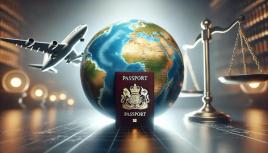
Blogs • July 18, 2025 • 17 Min
A Complete Guide to Italy’s Digital Nomad Visa for Remote Workers
With over 35 million digital nomads worldwide, the way we work, and where we work, is shifting fast. Countries are catching on, and Italy is now officially one of them. In 2024, Italy rolled out a dedicated Digital Nomad Visa, welcoming remote workers and freelancers who want to stay longer than a tourist visa allows and do it legally. Whether you’re a salaried employee working for a company abroad or a self-employed consultant with international clients, this visa offers a clear path to live and work in Italy, while also contributing to the local economy as a taxpayer. It's a legal framework tailored to the realities of modern work, not a workaround. In this guide, you’ll find everything you need to know, from requirements and documents to the best places to live and how this visa compares to other options in Italy. Understanding Italy's Digital Nomad Visa Program This visa targets non-EU citizens who work remotely for a foreign company or as freelancers outside Italy. It’s designed to attract skilled professionals, those with higher education or proven experience, who can work independently and support themselves without tapping into the local job market. Who It’s For To be eligible, applicants must meet the following basic criteria: Unlike some other residence options, this visa doesn’t allow job-seeking or employment with an Italian company. It’s strictly for remote workers who already have contracts or clients outside Italy. The government aims to balance the appeal of Italy’s lifestyle with legal clarity: applicants get one year of residency (renewable), access to services like banking and healthcare, and freedom to move within the Schengen Area. Key Requirements for Italy’s Digital Nomad Visa Before you pack your bags, here’s what you’ll need to qualify. Italy’s digital nomad visa has a few core requirements. They’re specific, but manageable if you’re already working remotely and earning steadily. Income Requirements and Financial Stability You’ll need to prove annual income of at least €28,000. This threshold is based on Italian welfare standards and is meant to show that you can support yourself without relying on local employment or public funds. Acceptable income sources: Remote employment contract with a foreign company Freelance or consulting work with international clients Business income if self-employed outside Italy You’ll need bank statements, tax returns, or employment contracts to verify this. Joint income with a partner or spouse is not accepted, the minimum applies to each individual applicant. Professional Qualifications and Work Experience Italy’s law requires “highly qualified professionals,” but in practice, that includes: A university degree or At least 5 years of proven work experience in your field Documentation might include diplomas, CVs, LinkedIn profiles, letters of reference, or client contracts. No need to get credentials "recognized" in Italy, just documented clearly in your application. Health Insurance Coverage You must carry private health insurance that covers your stay in Italy and includes: Emergency care Routine medical services Hospitalization This insurance must be valid before you enter the country and must remain active throughout your stay. European Health Insurance Cards (EHIC) don’t apply here. Proof of Remote Work Status This is the core of your application. Italy wants to see that your job is fully remote and based outside Italy. Accepted documentation includes: Employment contract stating remote work arrangement Letter from employer confirming remote setup If freelance: client contracts or recurring invoices Self-employed? Submit business registration docs and proof of earnings In short, the Italian authorities want to be sure you’re bringing your work with you—not planning to job-hunt locally. Application Process for Digital Nomads The process to apply for Italy’s Digital Nomad Visa isn’t overly complicated, but it does involve a few moving parts. Here's how it works from start to finish. Required Documentation Before applying, prepare the following documents: All documents must be translated into Italian, and in many cases apostilled or legalized depending on your country of origin. Visa Application Steps Book an appointment at the nearest Italian consulate or embassy in your home country. Submit your application in person with all documents. Wait for approval, you’ll get a visa sticker in your passport. Travel to Italy within the validity window (usually 6 months). Apply for a “permesso di soggiorno” (residence permit) at the local immigration office within 8 days of arrival. The visa alone lets you enter Italy, but the residence permit gives you legal permission to live there. Processing Times and Fees Visa processing: Typically 30 to 60 days, but can vary by consulate Application fee: Around €116 (may vary slightly by location) Residence permit fee (once in Italy): €70–100 It’s a good idea to allow at least 3 months from gathering documents to final approval. Legal Assistance Options You don’t need a lawyer to apply, but if your case is complex (freelance income across multiple countries, dual citizenship, etc.), you may want help. Some expats use: Immigration law firms specializing in Italy Visa services with document prep and appointment booking Local consultants familiar with regional offices in Italy Benefits of Italy’s Digital Nomad Visa Duration and Renewal Options The visa grants an initial 12-month stay, and yes, it’s renewable. If you continue to meet the core requirements, and health insurance, you can extend your stay without leaving the country. After 5 continuous years of legal residence, you may apply for permanent residency under Italian immigration law, which brings even more stability and access to public services. Travel Within Schengen Area Once you’re in Italy on a Type D national visa and secure your residence permit, you’re also allowed to travel freely within the 29 Schengen countries. No additional visas, no border headaches. This is especially helpful for remote workers who want to visit clients or co-working retreats across Europe while keeping Italy as a home base. Path to Permanent Residency If you renew your stay consistently and spend enough time in Italy each year, you can eventually apply for long-term EU residence. This comes with added perks: fewer bureaucratic hurdles, broader work rights within the EU, and a more stable legal standing in Italy. It’s not immediate, but this visa sets you on that path. Tax Implications Yes, taxes matter, and they’re a key part of the digital nomad equation. If you stay in Italy more than 183 days per year, you’re considered a tax resident. The good news? Italy offers favorable tax schemes for newcomers. For instance, certain workers can pay tax on only 30% of their foreign income (even less in southern regions), for up to 5 years, under the “impatriate regime.” That said, tax status depends heavily on your income source, home country, and personal setup, so talking to a tax advisor familiar with cross-border situations is highly recommended. For a deeper look at how taxes work once you're settled, check out our full guide on Italy’s tax system and expat benefits. Best Cities for Remote Workers Italy has a wide mix of cities that can work for remote professionals, but each one comes with its own setup in terms of pace, pricing, connectivity, and vibe. Here's a closer look at some of the top picks: Milan Milan is Italy’s financial and tech capital. If your remote job leans into fintech, marketing, startups, or fashion, this is the place with the best business infrastructure, fastest internet, and plenty of English-speaking professionals. Internet speeds: Consistently 200–500 Mbps in most neighborhoods Co-working culture: Huge; try Copernico, Talent Garden, and WeWork Cost of living: Around €1,800–€2,500/month, including a one-bedroom apartment Airport access: 3 international airports (MXP, LIN, BGY) with direct links across Europe Milan isn’t the cheapest, but it’s efficient. You’ll find networking events, tech meetups, and a strong expat base. Florence Florence is smaller, calmer, and deeply tied to the arts. It suits remote workers in design, writing, photography, or digital arts who want culture and walkability without the chaos. Internet speeds: Fiber is common in the city center (~100–300 Mbps) Community: Smaller but active; lots of freelancers and seasonal nomads Cost of living: €1,300–€1,800/month, with decent apartment options in Oltrarno or Campo di Marte Drawbacks: Fewer co-working spaces; summer gets tourist-heavy It’s a beautiful place to live and work if you don’t need to be constantly plugged into a fast-moving business scene. Bologna Bologna is an underrated gem for remote workers. Home to Italy’s oldest university, it has a solid infrastructure, tons of affordable rentals, and a lively yet low-key energy. Plus, it’s well-connected by train. Internet speeds: Reliable fiber in most areas Cost of living: €1,000–€1,500/month, with many long-term rental options Co-working: Emerging; check out Kilowatt or Tim Space Bonus: It’s in Emilia-Romagna, aka Italy’s best food region If you want a local feel without isolation, and can handle some student noise, Bologna is a great middle ground. Palermo Palermo offers the lowest cost of living among larger Italian cities and is becoming a go-to for digital nomads who prioritize lifestyle over speed. It’s not Milan, but it’s got sun, culture, and a creative scene. Internet speeds: Fiber is available but check building-level access Cost of living: €800–€1,200/month for solo living Co-working: Smaller scale—places like Moltivolti double as social hubs Caveats: Infrastructure is still catching up; expect slower bureaucracy It’s perfect for freelancers who work async and want to trade pace for quality of life and cost savings. Turin Turin (Torino) is often overlooked, but it's a solid option for remote professionals in engineering, software, and AI. It’s got a serious tech ecosystem, including Italy’s main automotive and robotics sectors. Internet speeds: Very good in central and business districts Cost of living: Around €1,100–€1,600/month Vibe: Calm, elegant, and organized, ideal for focused work Local scene: Not touristy, but highly livable It doesn’t scream “Italian postcard,” but for deep work and solid value, it’s an excellent choice. Comparing Italy's Digital Nomad Visa with Other Options Self-Employment Visa This is a long-standing option for freelancers and entrepreneurs, but it’s notoriously difficult to get. You need to apply for a spot within an annual quota system (called the decreto flussi), which limits the number of self-employed visas issued each year. On top of that, you must register with a local chamber of commerce, show business plans, and sometimes prove Italian clients or office space. Compared to the Digital Nomad Visa, this one is more complex, slower, and best suited to those planning to build a business inside Italy, not work remotely for clients abroad. Elective Residence Visa The Elective Residence Visa was never meant for working professionals. It’s designed for retirees or financially independent individuals who don’t plan to work at all. You must show passive income, from pensions, investments, or rental properties, usually around €31,000 per year minimum, with higher thresholds for couples. This visa doesn’t allow any kind of work activity, including remote work for a foreign company. Many digital nomads used to apply for it (quietly working anyway), but that’s now a legal gray area. The Digital Nomad Visa is far better aligned with how remote workers actually live and earn. EU Blue Card The EU Blue Card is a residence permit for highly skilled non-EU professionals offered a job in Italy with a local employment contract. It requires a university degree and a minimum salary (around €25,000–€35,000, depending on sector), and the sponsoring company must be based in Italy. It’s ideal for professionals moving for a full-time job in Italy, but not applicable to freelancers or people working for non-Italian employers. The Digital Nomad Visa is the more flexible option for remote and freelance workers. Investment Visa Options Italy offers an Investor Visa for people who want to invest €250,000–€2 million into Italian companies, government bonds, or philanthropic projects. This path is quick and relatively streamlined, but only if you have the capital. If you're not looking to make a major financial investment in Italy, this visa won’t apply. For remote workers with steady income but without six-figure capital, the Digital Nomad Visa is far more accessible. Setting Up Life in Italy Once you're in Italy with your visa, there are a few must-do steps to start building a smooth day-to-day routine. Here’s what to handle early on, from where to live to how to register for services. Finding Accommodation Most nomads begin with short-term stays and transition to longer rentals after arrival. Here’s how the process works: Start short-term: Use Airbnb, Spotahome, or Booking.com to get your footing. Search long-term: Platforms like Idealista and Immobiliare.it offer apartment listings across Italy. Required documents for leases: Valid passport and visa Codice fiscale (Italian tax ID) Proof of income or work contract 1–3 months’ rent as a deposit Tip: In smaller towns, listings may be in Italian only, and agencies may not respond quickly, patience is part of the process. Healthcare Registration You're required to have private health insurance before entering Italy, but once you receive your residence permit, you can optionally join the public healthcare system (SSN). Enrollment: Register at your local ASL (Azienda Sanitaria Locale) Annual fee: Typically between €1,000–€2,000 (based on self-declared income) Services covered: GPs, hospitals, specialist care, lab work More info on the national system can be found via Italy’s Ministry of Health. Banking Services Opening a bank account is helpful if you’re staying long-term. Required for: Rent payments, SIM cards, utility bills Options include: Traditional banks: UniCredit, Intesa Sanpaolo, BPER Digital banks: N26, Wise, and Revolut (faster onboarding, fewer fees) Tax Registration Process If you stay more than 183 days per year, Italy will likely consider you a tax resident. Here’s what that means: You must register with the Agenzia delle Entrate Declare your worldwide income (not just what you earn in Italy) Apply for a tax code (codice fiscale) if you haven't already File annual returns as an Italian tax resident Good news: “Impatriate Regime” for Remote Workers Italy offers a special tax scheme for newcomers transferring their tax residency to Italy: Up to 70% of your foreign income is exempt from taxation Valid for 5 years, with an option to extend In southern regions, the exemption increases to 90% This benefit is available to remote workers, freelancers, and employees who meet certain qualifications. A local commercialista (tax consultant) can help assess your situation and handle the paperwork. Working Remotely from Italy Italy is more than just a scenic backdrop, it can be a productive, stable base for remote professionals. Still, like anywhere, success depends on how well you adapt to its infrastructure, time zone, and local rhythms. Here’s what to know if you plan to actually get work done while enjoying la dolce vita. Business Infrastructure In larger cities, remote workers can count on reliable fiber internet, stable mobile networks, and easy access to printing, scanning, and shipping services (UPS, DHL, Poste Italiane). That said, rural or coastal areas may still have patchy Wi-Fi or rely more on mobile data. For remote teams, major cities offer private offices, Zoom booths, and meeting rooms in co-working spaces like Talent Garden (Milan, Rome) or Impact Hub (Florence, Bari). Professional Networking While Italy doesn’t have the networking density of Berlin or Amsterdam, it’s catching up, especially in tech, design, and content. In cities like Milan, Rome, and Bologna, you’ll find: Meetups and workshops hosted by co-working spaces Events organized through platforms like Eventbrite, Meetup, and Startup Grind English-speaking business communities and remote worker groups on Facebook or Slack For example, Rome has groups like Expats Living in Rome that host regular mixers for professionals, while Milan has a growing startup scene centered around Porta Romana and Isola. Common Challenges and Solutions Language Barriers English is spoken in major cities, tourist areas, and within most co-working communities. But outside of that, at the post office, local government offices, or with landlords, Italian is often required. Even basic tasks like setting up utilities or picking up a package can become tricky without some language skills. Solution: Learn key phrases through apps like Duolingo or Babbel Take beginner classes online or locally Use Google Translate’s camera feature for reading forms and signs Consider hiring a local fixer or translator for visa-related errands Administrative Procedures Italian bureaucracy has a reputation, and it’s not unwarranted. Expect long wait times, inconsistent requirements between offices, and paperwork-heavy processes. Things like registering your residence, getting your permesso di soggiorno, or even setting up Wi-Fi can take longer than expected. Solution: Always make copies of every document (ID, visa, lease, tax code, etc.) Get your codice fiscale early, it’s the golden key for most services Join local expat forums to learn how others handled similar steps Be patient and polite, it really does help move things along Cultural Integration You might love the food, the vibe, the architecture, but feeling truly “part of it” takes effort. Italians are welcoming, but friendships often grow through shared routines, not quick intros. Without a workplace or school community, digital nomads can feel a bit adrift socially. Solution: Frequent the same local café or market, consistency builds connections Sign up for language exchanges, yoga classes, or food tours Get involved in city-specific Facebook or WhatsApp groups Remember: saying “buongiorno” and “grazie” goes a long way Work-Life Balance Italy’s slower pace of life can be both a blessing and a challenge. It might feel frustrating when stores close midday or things move slower than expected. But it’s also a reminder to unplug, reset, and not burn out. Finding a new rhythm takes time. Solution: Design your work hours around local rhythms (early mornings, late evenings) Use slow periods, like lunch breaks or Sundays, to explore your neighborhood Separate work and personal space, especially if working from home Adopt the Italian way: don’t rush, and don’t work through every coffee break Future of Digital Nomad Visas in Italy Italy’s Digital Nomad Visa is still new, which means the system is evolving, and there’s more to come. As the government gathers data and feedback from early applicants, updates to the process and policy are likely. Here's a look at where things might be headed. Expected Policy Changes Since its launch in April 2024, the visa framework has already seen some adjustments, mainly around documentation and processing timelines. Over the next year, the Italian Ministry of the Interior is expected to release more detailed application guidelines, especially for freelancers and entrepreneurs with non-traditional work setups. Possible changes on the horizon: Clearer tax frameworks for digital workers Digital application portals to reduce embassy bottlenecks Expansion to include remote teams or dependents more easily The government has hinted at further efforts to attract foreign talent to boost local economies, especially in underpopulated towns and southern regions. Long-term Prospects Italy sees digital nomads as part of its broader strategy to revitalize smaller towns, fight brain drain, and support local economies without overloading infrastructure. If demand for this visa grows, it could become part of larger relocation packages or even tie into regional incentives (like Calabria’s €1 home schemes or Sardinia’s relocation bonuses). Already, some municipalities are experimenting with nomad-friendly hubs, offering co-living and co-working spaces with municipal support. Integration with EU Policies Italy is also watching how the European Union might approach a more unified stance on remote work visas. While each Schengen country currently sets its own rules, there’s growing interest in harmonizing remote worker regulations to make cross-border movement even smoother. Italy’s visa may eventually sync more tightly with broader EU migration policies, especially if more countries follow suit. For now, Italy’s is one of the clearest and most structured programs in the EU zone for non-EU digital nomads. FAQs on Italy Digital Nomad Visa 1. What is the legal basis for this visa? Italy’s Digital Nomad Visa is established under Decree-Law No. 4/2022, which updated Italy’s immigration code, and was further detailed in a ministerial decree on February 29, 2024. The visa officially became active on April 4, 2024. 2. Who qualifies as a “digital nomad” or “remote worker”? The program applies to non-EU citizens engaged in highly qualified remote work for a foreign employer or as a freelancer and must supply at least six months of prior experience in their field. Qualifications include a university degree or comparable years of experience, three years for IT specialists, five years otherwise. 3. What is the minimum income requirement? Applicants need to demonstrate stable annual earnings. The threshold is set at approximately €28,000–€32,400/year (about €2,300–€2,700/month), depending on the source and region. Couples or families will need higher income or savings. 4. Can I bring my family with me? Yes. The visa supports family reunification, allowing spouses and dependent children to join. You’ll need to show extra income or savings to support any dependents. 5. How long is the visa valid, and can it be renewed? The visa is initially valid for 12 months, and you can renew it within Italy if you still meet the requirements, income, remote work, and insurance. After five consecutive years, you may apply for permanent residency. References Ambasciata d’Italia a Pristina. (2024, April 4). Digital nomad and remote worker visa. Ministero degli Affari Esteri e della Cooperazione Internazionale. https://ambpristina.esteri.it/en/servizi-consolari-e-visti/servizi-per-il-cittadino-straniero/visti/visto-per-nomadi-digitali-e-lavoratori-da-remoto/ Consolato Generale d’Italia a Londra. (2024). Digital Nomad Visa for self-employed only. Ministero degli Affari Esteri e della Cooperazione Internazionale. https://conslondra.esteri.it/en/servizi-consolari-e-visti/servizi-per-il-cittadino-straniero/visti/digital-nomad-visa-for-self-employed-only/ Ministero dell’Interno. (2024). Visto per nomadi digitali e lavoratori da remoto: Linee guida operative. Decreto Interministeriale 29/02/2024. https://www.interno.gov.it/it/notizie/visto-nomadi-digitali-e-lavoratori-remoto-linee-guida-operative
Latest Articles













PORTUGAL | RESIDENCY BY INVESTMENT
READY TO APPLY?
Citizenship enquiry

